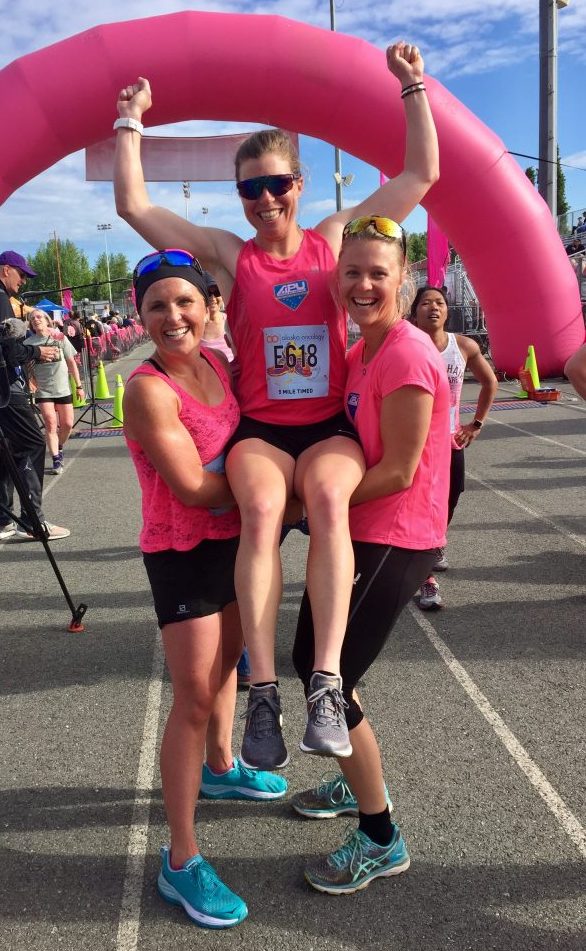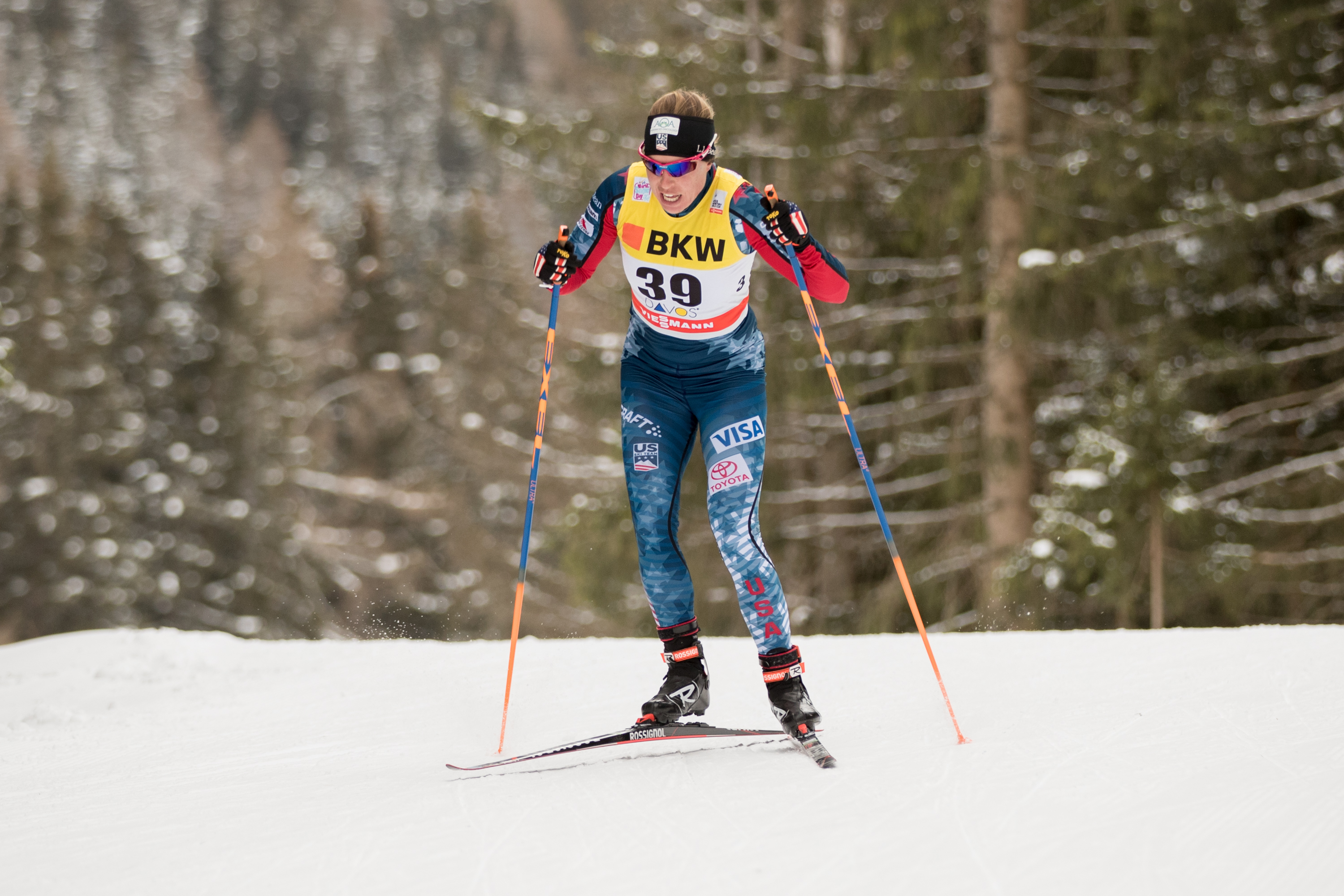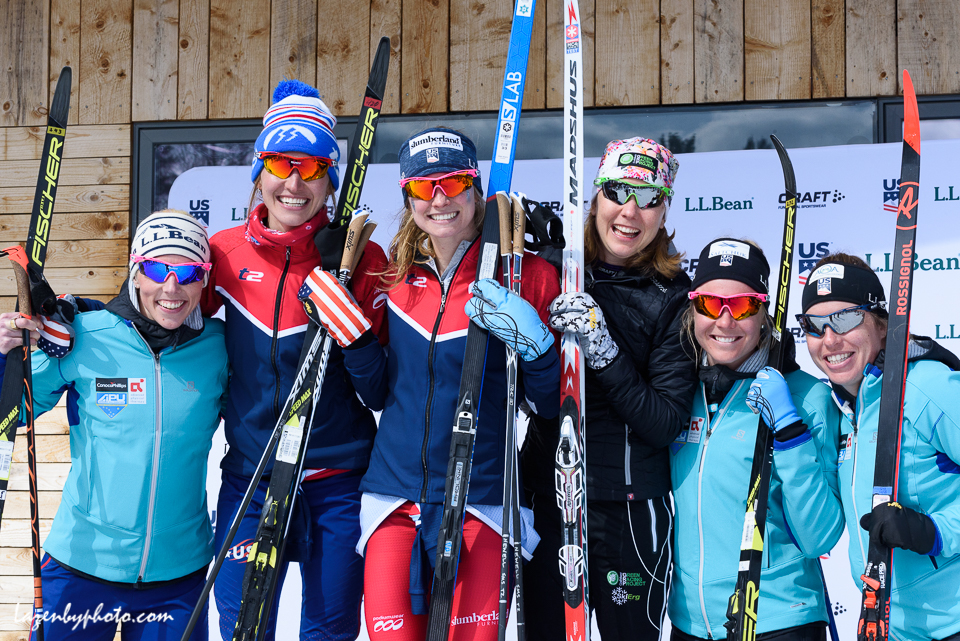
The last time Rosie Brennan was focused on competitive running, she was sporting a red, white and black singlet as a senior at Park City High School in Utah. In the 11 years since, the former U.S. Ski Team member’s running has shifted from a seasonal sport to supplemental training for her true passion: cross-country skiing.
Yet earlier this month, on June 9, Brennan surged to the front of the Alaska Run for Women in Anchorage, Alaska, where she lives and trains with the Alaska Pacific University (APU) nordic ski team. She was first across the line in the 5-mile road race, finishing in 27 minutes, 31 seconds. Brennan also broke the course record by 5 seconds (in 2002 Chris Clark won it in 27:36). Notably, Clark raced to 19th in the 2000 Olympics marathon in Sydney, Australia.
Prior to this spring, Clark had been the only woman to break the 28-minute mark in the Alaska Run for Women’s 26-year-long history. Brennan, 29, joined her ranks, along with 28-year-old Anna Dalton, who finished four seconds behind Brennan for second place in this year’s race. Nineteen-year-old Caroline Pennacchio placed third with a time of 29:53. More than 5,000 women participated in this year’s race, an event Brennan’s former teammate Kikkan Randall has won numerous times.
While Brennan ran the race casually with friends a few years ago, the 2018 Run for Women marked her first real race on pavement since high school, according to the Anchorage Daily News.
“I’ve always hesitated to actually race it,” Brennan told FasterSkier during a recent phone interview. “The part I was most worried about was getting an injury.”
The 5-mile course covers paved roads and bike paths, and Brennan feared that a hard effort on that kind of surface would take a toll on her body. But this spring, she said she wanted to “spice things up.” That, and she wanted to test her recovery after a long bout with mononucleosis.
An uphill battle
Looking back through her training log, Brennan can pinpoint the exact day she began to feel off. In late December, at the end of the first period of World Cup racing and just before the 2018 Tour de Ski, she described her sensations as “going up and down.”

At the time, she assumed the source of her fatigue was from the previous four weekends of racing. She had started the 2017/2018 World Cup season with four top 30’s and two top 20’s, her strongest Period 1 results to date. Perhaps her body was adjusting to the new level of fitness and racing she was putting forth.
Thinking the flagging she felt might be warranted, Brennan decided to enter the Tour de Ski. She finished the first race, a freestyle sprint, with a season-best result of 15th. But that Dec. 30 race was the high point of her World Cup season.
“My first race of the Tour was one of my best races all year, so I didn’t really think anything bad was going on,” Brennan reflected. “But that was a sprint race and for whatever reason, my sprinting wasn’t affected. … After that race I didn’t have any good races in the Tour. It was kind of just downhill from there.”
Brennan pushed through the Tour’s seven stages, finishing the final pursuit-style hill climb on Jan. 7 in 24th overall (out of 32 women), with the 17th-fastest time. That strong performance cap to a tough Tour, however, was no omen for the weeks to come.
“After the Tour, I just wasn’t recovering. I mean, I just felt miserable,” Brennan said. “But when you’ve raced like that, it’s easy to just be like, ‘Oh, it was just the Tour; it was really hard this year or the conditions were challenging. I was trying to make due, rest and get back to normal.”
Heading into the new year, Brennan sat out of the World Cup sprint weekend in Dresden, Germany, and resumed racing Jan. 20 in Planica, Slovenia. Even so, Brennan still felt off. She opted out of the Planica distance race to rest up for the following World Cup weekend in Seefeld, Austria, the last one before the Olympics. Less then a month before the Olympics began in PyeongChang, South Korea, Brennan’s APU coach, Erik Flora, flew to Europe and met with Brennan in person to discuss what might be going on.
“We both felt like I had probably gotten a virus,” Brennan reflected. “But with a virus there’s nothing you can do, so we decided just to rest it out and play the course and see what happened.”
In Seefeld, however, there was no remission. After the first 2 kilometers in the 10 k freestyle mass start, Brennan was spent. Wanting to investigate more, she had her blood count tested that weekend. The results showed nothing extraordinary, but they did indicate some sort of viral infection.
“There was nothing for me to do except rest,” Brennan said. “I didn’t get a mono test or anything at that point, because I was not showing any extreme symptoms.”
With her departure for PyeongChang just days away and the buildup of her first Winter Games, Brennan worked to get into an ideal headspace.
“It was really hard place to be,” she explained. “I was headed to my first Olympics and the last thing I wanted to do was convince myself there was something wrong with me. So at that point I just decided to do the opposite, tell myself I was fine, I just needed to rest, everything was going to be fine. That was kind of the approach I took, just rest it out, try to have fun, get back into the groove of things, be excited for the Olympics, and hope things will turn around.”
Unfortunately, her mono reached its peak in PyeongChang. She was offered a spot in the opening women’s race, the 15 k skiathlon, and not wanting to miss her Olympic debut, she started.
“You only get what opportunities you get,” Brennan said. “I had to take that skiathlon start and just hope that things would turn around, and I think that was unfortunately probably the peak of my mono.”
That race, which she finished in 58th place, turned out to be her only start at the Games. After the Olympics, she finished out the World Cup season, but not without difficulty.
“Every race was kind of the same: I would ski 2 to 3 k and then everything would just fall to pieces,” she said. “You don’t really realize how much of hole or like a tunnel you’re in until you step out of it. If I were to do it again, I would have just come home after the Olympics to try and figure it out.”
But as they saying goes, hindsight is 20/20.
“At the time, you just keep telling yourself, OK, you’re going to get it this weekend, things are going to turn around,” Brennan said. “It’s really hard to not have that attitude when you’re over there because you’re trying to have fast races and you’re trying to make the most of the bad situation.”
Getting answers, moving forward

When Brennan did return to her training base in Anchorage, it was late March after competing at SuperTour Finals in Craftsbury, Vermont. An Anchorage doctor with whom Brennan had been corresponding with agreed to run a few tests upon her return. One of those tests was for mono.
“That came back positive,” Brennan said. “It was nice to know, because after awhile I was starting to think that I was going crazy, but I was also frustrated because I had just spent three months trying to race when I probably shouldn’t have been. … My biggest fear was that by racing that whole time, I had driven it so far into my body that I would never come out.”
With that in mind, Brennan took April slow. Training took a back seat, as it does for most professional cross-country skiers that month. Brennan went biking, but for minimal amounts of time. When she felt tired, she stopped. By the time May 1 rolled around, Brennan decided she was feeling strong enough to jump into APU’s start-of-the-season training. It was then that she also decided she would enter Alaska’s Run for Women.
In order to train for the race, Brennan didn’t stray from her ski-specific training plan. Her biggest change was running her strength warmups and cool downs on pavement.
“Racing on roads requires a lot more leg speed and that was the part that I was worried about, whether I had enough leg speed,” Brennan said.
She also did one-minute strides with the APU team when they incorporated them into their training sessions. Otherwise, her road-running prep was minimal. When race day finally came, Brennan forgot to start her watch at the start.
“Retrospectively, I’m really glad that I did [forget] because I would have slowed down if I had known how fast we were running,” she said.

Brennan and Dalton averaged around 5:30 minute/miles for the duration of the race, though for the most part, Brennan indicated she couldn’t hear any of the splits she was being given.
“At one point someone yelled, ‘That was a 5:15 mile!’ and I was like, ‘Haha, that’s really funny,’ ” Brennan recalled with a laugh.
Assuming that Dalton would make a move in the last 1,600 meters, Brennan hung tight to the experienced runner and aimed match her strides.
The move from Dalton never came. With about a minute left in the race, Brennan took the lead through the course’s final turns before the finish, which was on a final curve of a 400-meter track.
antabuse, buy xalatan online, buy fml online
“Once I went, I realized that I actually had close to nothing left,” Brennan said of her final move. “I was like, ‘Oh no, she is going to pass me, she’s going to pass me. When I finally turned to the final 75 meters, I could see the clock it said, like, 27 something, and I had a rough idea what times were for the race, so I knew that was really fast. Then I was like, ‘Oh my gosh, I hope I actually get to the line.'”
Brennan did, taking the win and the record with it.
“I had no idea that we had broken the record,” Brennan said. “Once Anna finished, she came up to me and said she thought that we had both gone under [the course record], that was when it really hit me, how fast we had been running that whole time.”

The road-race win was Brennan’s first ever. At a running time trial with APU the weekend before, she had come close to a personal best. Both performances gave her confidence as she looked ahead to the rest of the training season.
“I definitely surprised myself,” Brennan said referring to her running victory. “To have that race really reassured me that I am moving in the right direction.”
A U.S. Ski Team member until this spring (she was originally named to the national team in high school, then after a six-year absence was renamed in the spring of 2015), Brennan was not renominated for her fourth-consecutive season in May. But even apart from the national team, she remains focused on racing internationally on the World Cup.
“I’m hoping for some World Cup starts and World Championships,” she said. “I’ll be working towards those.”
Gabby Naranja
Gabby Naranja considers herself a true Mainer, having grown up in the northern most part of the state playing hockey and roofing houses with her five brothers. She graduated from Bates College where she ran cross-country, track, and nordic skied. She spent this past winter in Europe and is currently in Montana enjoying all that the U.S. northwest has to offer.



